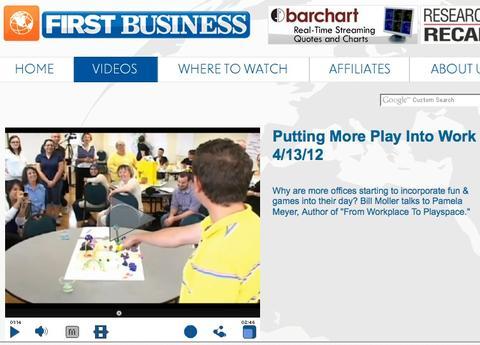If you are like most of us, you likely got the idea along the way that work and play are incompatible. Work is serious, focused and productive while play is silly, unfocused and unproductive. This belief was socialized into us from a very early age with parents and caregivers who shooed us away when we attempted to recruit a playmate with “Not now, honey, can’t you see I’m working?”

Pamela talks about putting more play into work in this recent First Business Interview
As it turns out individuals and organizations that chose not to believe that work and play must live in separate domains are thriving. Google, one of the most successful businesses of all time, lists on its website one of the “Top Ten Reasons to Work at Google”: ‘‘Work and play are not mutually exclusive: It is possible to code and pass the puck at the same time.’’
Google and many other organizations embrace two forms of play:
— Diversionary
— Engaging
Diversionary play is when we take a short break to play a game, stretch, participate in a contest. This type of play refreshes and energizes us, while building social bonds that are crucial to getting work done. Research also shows that when people return from diversionary play or short warm-up activities they are more creative and engaged (Conti, Amabile, & Pollack, 1995).
Engaging Play is when the work itself becomes a form of play. People are playing with new ideas, enthusiastically playing new roles, creating more play (flexibility) in the system and developing the capacity for improvised play. This form of play can come to life in a committee meeting, over coffee with a colleague or even working solo. The most important thing is that you are giving yourself permission to explore new ideas and perspectives and doing so from a place of intrinsic motivation.
Each of these forms of play reinforces the other. When we regularly take play breaks we return refreshed and energized to approach our work more playfully and creatively. When our work is a form of play, we are likely to enjoy diversionary activities with our colleagues and continue to build a culture of innovation, learning and change.
Conti, R., Amabile, T. M., & Pollack, S. (1995). The positive impact of creative activity: Effects of creative task engagement and motivational focus on college students’ learning. Personality and Social Psychology Bulletin, 21, 1107-1116.
